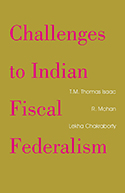
Research Topics
Publications on Fiscal federalism
There are 5 publications for Fiscal federalism.
-
Moral Hazard and the State Budget Crisis
One-Pager No. 64 | August 2020As congressional negotiations stall and state governments are poised to enact significant austerity, Alex Williams argues that fiscal aid to state governments should be tied to economic indicators rather than the capriciousness of federal legislators. Building this case for reform requires confronting a common objection: that state fiscal aid creates situations of moral hazard. This objection misconstrues the agency of state governments and misunderstands the incentives of federal politicians, according to Williams. There is a serious moral hazard problem involved here—but it is not the one widely claimed.Download:Associated Programs:Author(s):Alex Williams -
Moral Hazard in a Modern Federation
Public Policy Brief No. 152, 2020 | August 2020The mainstream fiscal federalism literature has led to an instinctive belief that states receiving fiscal aid during a recession are taking advantage of the federal government in pursuit of localized benefits with dispersed costs. This policy brief by Alex Williams challenges this unreflective argument and, in response, offers a novel framework for understanding the relationship between the business cycle and fiscal federalism in the United States.
Utilizing the work of Michael Pettis, Williams demonstrates that a government unable to design its own capital structure is not meaningfully an agent with respect to the business cycle. As such, they cannot be considered agents in a moral hazard problem when receiving support from the federal government during a recession.
From the perspective of this policy brief, the operative moral hazard problem is one in which federal-level politicians reap a political benefit from a seemingly principled refusal to increase federal spending, while avoiding blame for crisis and austerity at the state and local government level. Williams’ proposed solution is to impose macroeconomic discipline on federal policymakers by creating automatic stabilizers that take decisions about the level of state fiscal aid in a recession out of their hands.Download:Associated Programs:Author(s):Alex Williams -
Budget Credibility of Subnational Governments
Working Paper No. 964 | July 2020Analyzing the Fiscal Forecasting Errors of 28 States in India
Budget credibility, or the ability of governments to accurately forecast macro-fiscal variables, is crucial for effective public finance management. Fiscal marksmanship analysis captures the extent of errors in the budgetary forecasting. The fiscal rules can determine fiscal marksmanship, as effective fiscal consolidation procedures affect the fiscal behavior of the states in conducting the budgetary forecasts. Against this backdrop, applying Theil’s technique, we analyze the fiscal forecasting errors for 28 states (except Telangana) in India for the period 2011–16. There is a heterogeneity in the magnitude of errors across subnational governments in India. The forecast errors in revenue receipts have been greater than revenue expenditure. Within revenue receipts, the errors are more significantly pronounced in the grants component. Within expenditure budgets, the errors in capital spending are found to be greater than revenue spending in all the states. Partitioning the sources of errors, we identified that the errors were more broadly random than due to systematic bias, except for a few crucial macro-fiscal variables where improving the forecasting techniques can provide better estimates.Download:Associated Programs:Author(s): -
Indian Fiscal Federalism at the Crossroads
Working Paper No. 937 | October 2019Some Reflections
There is a growing recognition that fundamental changes are happening in Indian fiscal federalism ex post the abolition of the Planning Commission, the creation of the National Institution for Transforming India (NITI) Aayog, the constitutional amendment to introduce the Goods and Services Tax (GST), the establishment of the GST Council, and the historically high tax devolution to the states based on the 14th Finance Commission’s recommendations. Recently, policymakers and experts have raised a few issues, including: whether or not to make Finance Commissions “permanent” or to abolish them by making the tax devolution share constant through a constitutional amendment; the need for an institution to redress spatial inequalities in order to fill the vacuum created by abolishing the Planning Commission; and making the case for Article 282 of the constitution to be circumscribed. The debates are also focused on whether there is a need to establish a link between the GST Council and Finance Commissions, and if India should devise a mechanism of transfer that is predominantly based on sharing of grants for equalization of services rather than tax sharing. Creating a plausible framework for debt-deficit dynamics while keeping the fiscal autonomy of states intact and ensuring output gap reduction and public investment at the subnational level without creating disequilibrium were also other matters of concern. These debates are significant, especially when a group of states came together for the first time ever to question the terms of reference of the 15th Finance Commission amid growing tensions in federal-state relations in India. -
Challenges to Indian Fiscal Federalism
Book Series, October 2019 | October 2019 The principle of fiscal federalism enshrined in India's Constitution is under severe strain today. This book is a key addition to understanding the challenges involved. The authors capture the implications of the abolition of the Planning Commission, the introduction of the controversial Goods and Services Tax regime, and formulation of Terms of Reference of the 15th Finance Commission. These include the increase in vertical fiscal inequity, distortion of fairness in inter-State distribution, and erosion of policy autonomy at the level of the States.
The principle of fiscal federalism enshrined in India's Constitution is under severe strain today. This book is a key addition to understanding the challenges involved. The authors capture the implications of the abolition of the Planning Commission, the introduction of the controversial Goods and Services Tax regime, and formulation of Terms of Reference of the 15th Finance Commission. These include the increase in vertical fiscal inequity, distortion of fairness in inter-State distribution, and erosion of policy autonomy at the level of the States.
Published by: Leftword PressAssociated Program:
